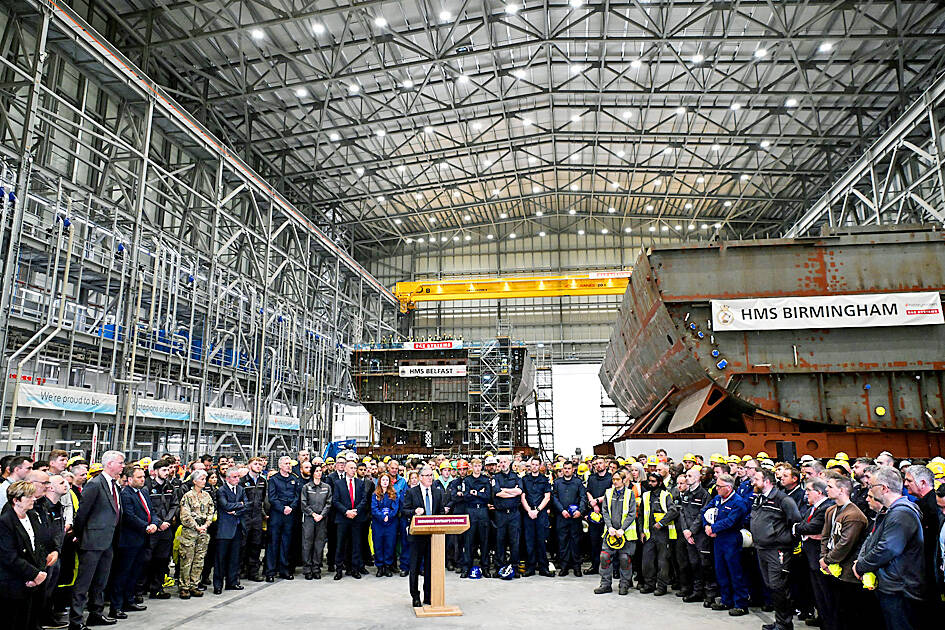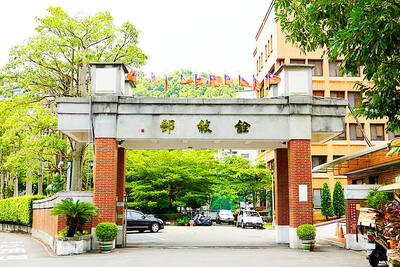The UK yesterday announced that it would build 12 new attack submarines as it launched a major defense review to move the country to “war-fighting readiness” in the face of “Russian aggression” and the changing nature of conflict.
British Prime Minister Keir Starmer warned that “the threat we now face is more serious, more immediate and more unpredictable than at any time since the Cold War,” as he launched the review in Glasgow, Scotland.
“We face war in Europe, new nuclear risks, daily cyberattacks, growing Russian aggression in our waters, menacing our skies,” he added.

Photo: Reuters
The Strategic Defense Review, which assesses threats facing the UK and makes recommendations, said that Britain is entering “a new era of threat.”
As a result, Starmer said his government aimed to deliver three “fundamental changes.”
“First, we are moving to war-fighting readiness as the central purpose of our armed forces,” he said.
“Every part of society, every citizen of this country, has a role to play, because we have to recognize that things have changed in the world of today. The front-line, if you like, is here,” he added.
Secondly, the prime minister said the UK defense policy would “always be NATO first,” and finally that the UK “will innovate and accelerate innovation at a wartime pace so we can meet the threats of today and of tomorrow.”
The UK has been racing to rearm in the face of the threat from Russia and fears that US President Donald Trump would no longer help protect Europe.
Starmer said it would serve as “a blueprint for strength and security for decades to come,” taking into account the increasing use of drones and artificial intelligence on the battlefield.
His government in February pledged to lift defense spending to 2.5 percent of GDP by 2027 in the “largest sustained increase in defense spending since the end of the Cold War.”
Moreover, despite budget constraints, it aims for spending to rise to 3 percent of GDP in the next parliamentary term, due in 2029.
The Labour government has said it would cut UK overseas aid to help fund the spending.
Based on the recommendations of the review, which was led by former NATO secretary-general George Robertson, the government on Sunday said that it would boost stockpiles and weapons production capacity, which could be scaled up if needed.
This includes £1.5 billion (US$2 billion) for building “at least six munitions and energetics factories,” procuring 7,000 domestically built long-range weapons, and spending £6 billion on munitions over the current parliamentary term.
The government also said late on Sunday that it would build up to 12 new attack submarines as part of its AUKUS military alliance with Australia and the US. Currently, the UK is set to operate seven nuclear-powered Astute Class attack submarines, which are to be replaced by the 12 AUKUS submarines from the late 2030s.
The British Ministry of Defence also said it would invest £15 billion in its nuclear warhead program and last week pledged £1 billion for the creation of a “cybercommand” to help on the battlefield.
While launching the new review, Robertson said it would tackle threats from Russia, China, Iran and North Korea, calling them a “deadly quartet.”
However, in an op-ed article for the Sun newspaper, Starmer did not mention China, while warning that the “Kremlin is working hand in hand with its cronies in Iran and North Korea.”
The softer rhetoric on China is in line with the Labour government’s efforts to thaw relations with Beijing, which reached new lows under former prime minister Rishi Sunak’s Conservative government.
The review describes Russia as an “immediate and pressing” threat, but calls China a “sophisticated and persistent challenge,” the Guardian said.
At a time when Washington is demanding that its NATO allies bolster their own defenses, Britain is considering strengthening its deterrent by buying nuclear-missile capable aircraft from the US, the Sunday Times reported.

Taiwan Semiconductor Manufacturing Co (TSMC, 台積電) is expected to start construction of its 1.4-nanometer chip manufacturing facilities at the Central Taiwan Science Park (CTSP, 中部科學園區) as early as October, the Chinese-language Liberty Times (the Taipei Times’ sister newspaper) reported yesterday, citing the park administration. TSMC acquired land for the second phase of the park’s expansion in Taichung in June. Large cement, construction and facility engineering companies in central Taiwan have reportedly been receiving bids for TSMC-related projects, the report said. Supply-chain firms estimated that the business opportunities for engineering, equipment and materials supply, and back-end packaging and testing could reach as high as

CHAMPIONS: President Lai congratulated the players’ outstanding performance, cheering them for marking a new milestone in the nation’s baseball history Taiwan on Sunday won their first Little League Baseball World Series (LLBWS) title in 29 years, as Taipei’s Dong Yuan Elementary School defeated a team from Las Vegas 7-0 in the championship game in South Williamsport, Pennsylvania. It was Taiwan’s first championship in the annual tournament since 1996, ending a nearly three-decade drought. “It has been a very long time ... and we finally made it,” Taiwan manager Lai Min-nan (賴敏男) said after the game. Lai said he last managed a Dong Yuan team in at the South Williamsport in 2015, when they were eliminated after four games. “There is

Democratic nations should refrain from attending China’s upcoming large-scale military parade, which Beijing could use to sow discord among democracies, Mainland Affairs Council Deputy Minister Shen You-chung (沈有忠) said. China is scheduled to stage the parade on Wednesday next week to mark the 80th anniversary of Japan’s surrender in World War II. The event is expected to mobilize tens of thousands of participants and prominently showcase China’s military hardware. Speaking at a symposium in Taichung on Thursday, Shen said that Chinese Minister of Foreign Affairs Wang Yi (王毅) recently met with Indian Prime Minister Narendra Modi during a visit to New Delhi.

FINANCES: The KMT plan to halt pension cuts could bankrupt the pension fund years earlier, undermining intergenerational fairness, a Ministry of Civil Service report said The Chinese Nationalist Party (KMT) caucus’ proposal to amend the law to halt pension cuts for civil servants, teachers and military personnel could accelerate the depletion of the Public Service Pension Fund by four to five years, a Ministry of Civil Service report said. Legislative Speaker Han Kuo-yu (韓國瑜) on Aug. 14 said that the Act Governing Civil Servants’ Retirement, Discharge and Pensions (公務人員退休資遣撫卹法) should be amended, adding that changes could begin as soon as after Saturday’s recall and referendum. In a written report to the Legislative Yuan, the ministry said that the fund already faces a severe imbalance between revenue